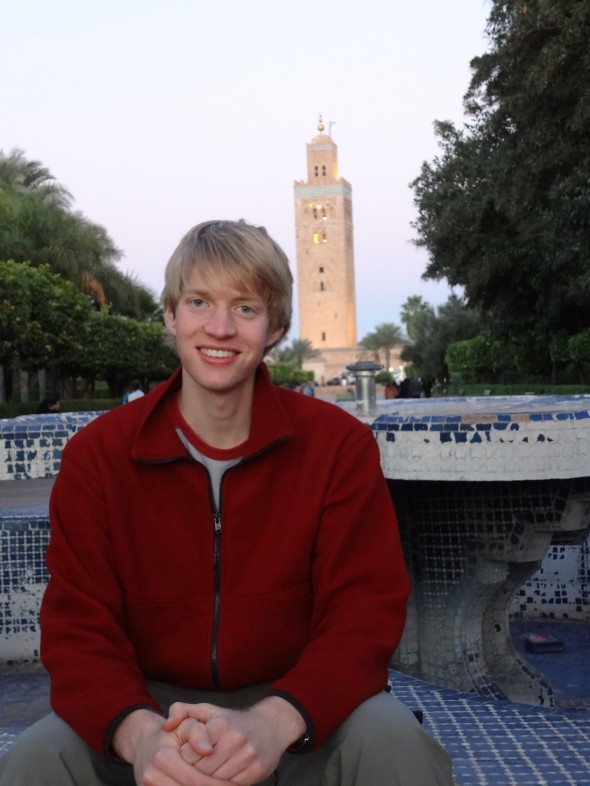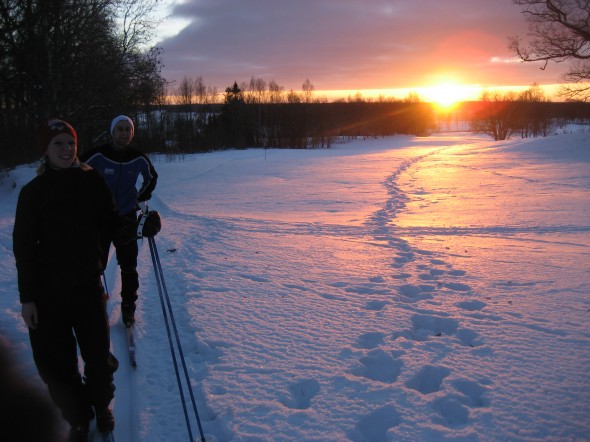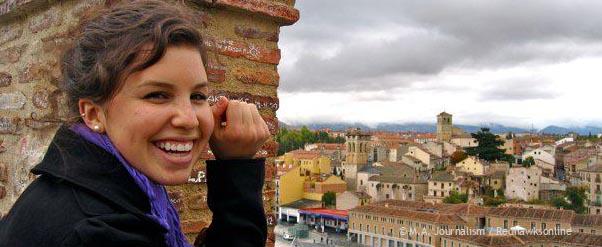Minnehaha alums expand their cultural palate through travelling and studying abroad

The El Alcazar Castle stands in Segovia, Spain, only 30 seconds away from the temporary home of Yaeger. The castle acted as inspiration for Disney’s iconic castle.
“I was once headbutted by a drunken Scotsman for no apparent reason,” laughed Walker Angell (’07). “The British people are wonderful and can be especially warm, though there are exceptions.”
Angell’s interesting memory comes from his experience studying abroad in Scotland. For Minnehaha grads, studying abroad acted as anything from a way to replace a gap year to a program specific choice. Whether going through an American college for only a semester or enrolling in a foreign college, Minnehaha has been represented in many countries, some as close as Canada and some as far as Sweden.
According to the International Organization for Economic Cooperation and Development, the number of students studying abroad worldwide rose from 800,000 in 1975 to 3.7 million in 2009. Students study anywhere from one month (January term) to their entire college experience. The most common profile of an American student studying abroad is a white female in her junior year with European countries being the most common hosts, describing exactly the situation of Allison Yaeger (’09).
“I studied abroad in Segovia, Spain,” said Yaeger. “It is the most beautiful, fairytale-like city I’ve ever seen.”
As a part of a joint program with Bethel University and Concordia College Moorhead, Yaeger went to Spain with 21 other students and took classes with Spanish professors at a small university.
“All of the classes [and everything else] were in Spanish,” said Yaeger. “I absolutely loved being immersed in the language like that!”
Living with a host family, Yaeger saw first-hand what their culture was like.
“It’s so easy to assume that the whole world does things like America and that just isn’t true,” she said. “I learned that other cultures have different preferences.”
While eating dinner as late as 11 at night may have taken some getting used to for Yaeger, Ana-Marie (Halverson) Tufenk (’06) found the prices in Spain much easier to adjust to than in England. Attending Capernway Bible School in both countries, Tufenk loved both experiences despite the cost.
“Both had their ups and downs,” said Tufenk. “[In] Spain, the school was just two blocks from the ocean. In England, the school was in a manor, but I called it a castle. It even had a dungeon.”
Tufenk found not only education, but importa
nt lessons in these opportunities.
“Living in other countries definitely made me realize that there is more to life than just [what is here] in Minnesota,” said Tufenk. “In both countries, we took mini mission trips to people who couldn’t afford life’s simple pleasures. In these moments, I realized we were put on earth to do God’s will.”
Tufenk strengthened her own religion while travelling, but Zach Robbins (’09) learned about a faith that wasn’t his own. Earning a degree in international studies, Robbins was almost expected to study in another country, which happened to be Morocco.
“I wanted to study in a country that spoke French that wasn’t France, and Morocco was the most interesting country that fit that criteria,” said Robbins. “[Also], I’m very interested in interfaith work and I wanted to learn more about Islam and about myself by living as a minority in a Muslim country.”
While living with a Moroccan family, Robbins took part in Eid al-Ahda, a holiday remembering Abraham’s sacrifice, where each family sacrifices a sheep and shares a portion of the meat with the poor.
“The most meaningful aspect of the experience was a new appreciation for Islam,” he said, “seeing it lived out in daily life as a religion of love, mindfulness of God and a service to the poor.”
But not all his observations were positive.
“Since Moroccan society, like the Middle East, is largely gender segregated in the social sphere, men don’t really know how to interact with women,” he said. “They treat [foreign] women how they think [they] want to be treated based on American movies. As a result, women are often ridiculed with cat-calls in the street.”

Robbins sits with the Koutoubia Mosque, the largest mosque in Marrakech, Morocco, in the background.
While Robbins’ spent only a semester abroad and found it to be generally positive, Angell attended a foreign college all fours years and didn’t always feel enthusiastic about it.
“From my present vantage, I can say that I thoroughly enjoyed being in Scotland and it was a great decision,” said Angell. “However, I would be remiss if I did not say that my answer would have been emphatically negative had I been asked that after my first year. A lot of things changed in my life. I think it took a greater toll on me than I had expected.”
Despite his doubts early on, Angell found Scotland to be a great experience, even meeting his wife while in St. Andrews. Still, Angell wasn’t originally planning on going to Scotland.
“I had been planning to go to university somewhere in Europe throughout high school,” said Angell. “I applied to several British universities and one in Holland, but was hoping to go to university in England. It was only after I visited St. Andrews that I decided to accept my offer. The campus is the same as the town of St. Andrews, and the town is nothing short of majestic. I was sold.”
Also attending a foreign college for the entirety of her schooling, Alexandra
Peterson (’11) is getting her undergraduate in medicine at Newcastle University, a five year process in England, which will not require additional medical school. As a medical student, Peterson must deal with even more responsibilities.
“Students here, particularly medics, are in a lot of ways expected to be adults,” said Peterson. “In my course, I am expected to be responsible because we do interact with patients and we are professionals, albeit at the bottom of the totem pole.”
Along with her duties in school, Peterson the responsibility of finances, which are made more difficult with the use of the Euro.
“The north of England is much less expensive than living in London,” said Peterson. “Still, I eat a lot of toast and buy nothing with a brand name!”
Peterson’s choice for going abroad was based her career path, but some students travel for much different reasons. Instead of taking a gap year, Rachel Worthman (’12) spent her first semester in Ireland, an uncommon choice when it comes to studying abroad.
“Studying abroad made me grow up a lot faster,” Worthman said. “Coming back to the United States, I feel like I shouldn’t be a freshman in college. It gets you living on your own, growing up, taking care of yourself and you jump into that a lot quicker. [Also], I had to manage my costs better.”

Gosen skis through Holsbybrunn, the location of his first stay in Sweden.
Reade Gosen (’06) also chose to study abroad for his first year of college, though he began by attending a Bible school as opposed to going for a semester through an American college like Worthman.
“Initially, the decision to go to Sweden was based solely off of the fact that I didn’t want to start college yet and travelling to Sweden by myself sounded like a good time,” said Gosen.
Gosen went to Bible school in Holsbybrunn for his first abroad experience, but went back for a study-abroad semester after “falling in love with Sweden.”
“My intentions for going this time were to embrace the language and culture a little more,” said Gosen. “Culturally, Swedes are way more reserved in the public sphere than Americans are. If you go into a grocery store in Sweden, it sounds like a library would in the US. If you’re riding on the bus or the train, it would be weird to start talking to a stranger. I’ve come to view my own culture in a different light because of my exposure and experience in a culture that is different from ours.”
Gosen is now fluent in Swedish and has worked at summer camps for underprivileged children in Sweden for the last two summers. While Gosen and many other students studying internationally went across the ocean, some simply went across the border. Sisters Anna (’10) and Audrey (’12) Jerome are both currently attending the University of British Columbia in Canada.
“I initially didn’t want to go because [Anna] went there,” said Audrey, “but after considering how big the campus is, I decided to go for it. It’s great because if I need anything or feel like hanging with her, I can, but I have yet to see her between classes [or] on campus much.”
Unfortunately, both sisters will be returning home, Anna for one year and Audrey until she returns to the west coast for grad school or a gap year.
“I will be transferring back to Minnesota due to finances and the like,” said Audrey. “[Living in a place with such high costs] can be a challenge. Canadian taxes drive up the prices of most consumer goods and rent is known for being high [in Vancouver], but at the same time health care is free and entertainment in the city is cheap and easy to come by, so it’s worth it.”
Anna agrees.
“The cost of living makes the cost of attending much higher,” said Anna. “But getting an on-campus job is not impossible and budgeting is important! There are also lots of ways to save money on food because Vancouver is a place where local and sustainably-produced foods are a priority.”
Similarly, Erik Hanschen (’07) went to UBC for the school itself and the outdoor adventures.
“There’s fantastic rock climbing, hiking and skiing,” he said. “Some of my favorite memories were days that I’d have class in the morning and once my classes were done for the day, I’d drive up to Whistler and most of the days ski in knee deep powder. Then come afternoon or evening, I’d be on the beach.”
No matter where these alumni found themselves in the days after high school, one thing that can be agreed upon is, as Angell put it: “A little perspective goes a long way.”
Make your own photo slideshow at Animoto.

